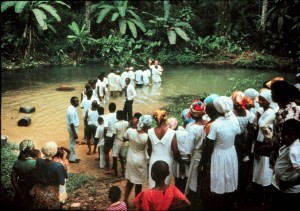
BYU will jump start Black History Month by hosting a panel discussing The Church of Jesus Christ of Latter-day Saints’ statement about race and the priesthood on Tuesday, Feb. 4.
The new statement, released by the Church in December, has awakened many questions in BYU students. Students are excited to attend the panel sponsored by BYU’s history department to learn more about the past and current history of blacks and the priesthood.
Anthony Bates, Black Student Union adviser at BYU, expressed his excitement about participating in the African American panel consisting of three faculty members, two current BYU students, one former student and himself.
“The purpose for the panel will be very student-focused in trying to help the students process their previous experience while addressing their future experience going forward in light of the announcement from the Church,” Bates said

A brief history leading up to the document the Church released will be given. The remainder of the time will be a question-and-answer session from the panel. Audience members will be able to participate and express their own questions. Panel members hope to convey insightful answers to the questions they will receive.
“I want to hear about how the statement has personally affected black members and what they thought about it,” said Olga Uceda, a sophomore studying psychology who plans on attending the panel. “I want to know how it affected their families before the original statement came out as well.”
Eric Schwantes, a senior studying business, is curious to hear if anything about other cultures is mentioned.
“I want to know why the Brazilians and other ethnicities could receive the priesthood and not the people of African descent,” Schwantes said. “I think it will be interesting to hear if African Americans still feel like there is a division or feel excluded in the Church.”
No one knows what questions will be asked or what answers will be given; however, this is an opportunity for BYU students to get involved with Black History Month activities on campus.
Black History Month began as Negro History week in 1926. It was started by historian Carter G. Woodson, father of African American history. It later evolved into Black History Month and became a national celebration in 1976. Canada, the United Kingdom, the United States and other countries devote February to celebrating black history.
“This is not just black history or African American history but a crucial element of American history and something that can help everyone understand our past, our present and possibly our future better,” said Rebecca de Schweinitz, associate professor in the history department at BYU.
Sahara Skagen, a senior studying communication disorders, said she has always felt passionate about civil rights and thinks it is beneficial for students to take advantage of what is being done on campus to make students aware of Black History Month.
“Learning to appreciate different people, cultures and what they have to offer is really important in understanding our country’s history,” Skagen said.
De Schweinitz highlighted Abraham Lincoln and said he had a large influence on why Black History Month takes place in February. During Lincoln’s presidency, people tried to claim him as a champion of black civil rights. The holiday became a national story and not specific to a particular group of people. The idea of Black History Month was attributed as a legacy to the president who saved the Union.
“Focusing on black history helps to expand people’s understanding of America’s past and of world history,” de Schweinitz said. “I think understanding history and people’s pasts is really important when trying to understand the world.”
The panel will take place on Feb. 4 at 7 p.m. in room B092 of the Joseph Fielding Smith Building on BYU campus.
For a calendar of events taking place for Black History month, visit http://multicultural.byu.edu/content/black-history-month.




